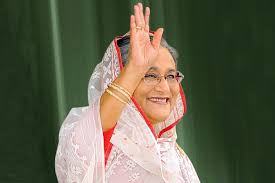Bangladesh’s interim government bans deposed PM Sheikh Hasina’s Awami League

Dhaka/New Delhi: Bangladesh’s interim government led by Muhammad Yunus Saturday evening banned deposed prime minister Sheikh Hasina’s Awami League under an anti-terrorism law.
The announcement to ban Hasina’s Awami League came after the student-led newly-floated National Citizen Party (NCP) activists rallied since Thursday and carried out blockades across Dhaka demanding the ban.
“The official gazette notification will be issued in this regard on the next working day,” Yunus’s office said, describing it as a “statement of the Council of Advisers” or the Cabinet.
The statement said the Council decided that the ban would remain effective until the completion of the “trial of the Awami League and its leaders in Bangladesh’s International Crimes Tribunal in the interest of protecting the country’s security and sovereignty”.
It said the decision was also taken for the security of the leaders and activists of the July 2024 uprising that eventually led to the ousting of the Awami League regime alongside the complainants and witnesses of the trial in the International Crimes Tribunal (ICT).
The meeting chaired by Yunus simultaneously amended the ICT law allowing the tribunal to try any political party, its front organisations and affiliated bodies.
Hasina’s 16-year-long Awami League regime was toppled on August 5 last year in a student-led violent mass uprising prompting the 77-year-old former prime minister to flee to India.
Three days after her ouster, Yunus took charge as the chief adviser of the interim government.
Hasina and many of her party leaders have been facing 100s of cases, including that of mass murder and corruption, since then. Most of her party leaders and ministers in her government are either arrested or fled abroad.
A large part of Students against Discrimination (SAD), which led the last year’s movement that ousted Hasina, crystalised as the National Citizen Party (NCP) earlier this year.
Formed in 1949, the Awami League led the movement for the autonomy of Bengalis in the then East Pakistan for decades and eventually led the Liberation War in 1971.
The announcement to ban Awami League came as Bangladesh on Saturday witnessed an escalating tension as NCP supporters marched towards Yunus’s official residence to mount pressure for the ban.
Media reports suggested that the NCP activists were joined by several Islamist and right-wing groups while they were staging a sit-in in front of nearby Shahgabh area of the capital.
Yunus’s office in a statement on Friday said the government had established contacts with different political parties in the run up to taking a decision to ban Awami League.
The Bangladesh Nationalist Party (BNP), which is Awami League’s main rival, has distanced itself from the demand saying they are opposed to a ban on any political party.
PTI
News